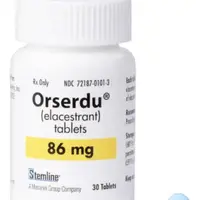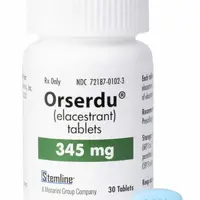Generic name: elacestrant
Drug class: Estrogen receptor antagonists, Hormones / antineoplastics
Dosage form: tablets
Availability: Prescription only
Pregnancy & Lactation: Risk data available
What is Orserdu?
Orserdu (elacestrant) tablets are used to treat advanced or metastatic breast cancer that is estrogen receptor-positive, HER2-negative, and also has an ESR1 mutation. It is used in postmenopausal women or adult men with breast cancer that has progressed after being treated with endocrine therapy.
Orserdu is from the class of drugs called a selective estrogen receptor downregulator (SERD).
Orserdu is a tablet that is taken once a day with food.
What is breast cancer that is HER2-negative, ER-positive with ESR1 mutation?
Orserdu is used in the treatment of specific types of breast cancer that is:
HER2-negative breast cancer is when cancer cells do NOT contain high levels of human epidermal growth factor receptor 2 (HER2). HER2 is a protein that controls cell growth. If your breast cancer is HER2-negative, it means your cancer may grow more slowly, and is less likely to spread or come back, when compared to HER2 positive cancer.
ER-positive breast cancer means it is estrogen receptor-positive (ER-positive). This means estrogen in your body can activate the estrogen receptors in your breast cancer cells to make your cancer grow. Blocking the ER with anti-estrogen hormone (endocrine) therapy can block the growth of cancer.
ESR1 mutation. Usually, when you have ER-positive cancer, it responds to endocrine (hormone) therapy, but after a while, it can stop working as the cancer becomes resistant to endocrine therapy. The reason for this may be the Estrogen Receptor 1 (ESR1) can change (mutate) so that the hormone therapy is no longer effective.
Advanced or metastatic breast cancer. Breast cancer can be described as advanced when it has spread locally to tissue near the breast or described as metastatic when breast cancer has spread to other parts of the body like the bones, liver, or lungs.
How should I use Orserdu
- Orserdu is a tablet that is taken once a day, at about the same time each day.
- Swallow the tablet whole, do NOT chew, crush or split the tablets before swallowing. Do not take any tablets that are broken, cracked, or that look damaged.
- Take Orserdu with food as this may help reduce nausea and vomiting.
- If you miss taking your tablet or vomit after taking a tablet, do not take another tablet on that day. Skip the dose and take your next dose the following day at your regularly scheduled time.
- Take this medicine exactly as your healthcare provider tells you.
- Do not change your dose or stop taking this medicine unless your healthcare provider tells you.
Before Taking
Before taking Orserdu, tell your healthcare provider about all of your medical conditions, especially if you:
- have liver problems
- are pregnant or plan to become pregnant.
Pregnancy and Orserdu
Orserdu can harm your unborn baby.
Females who are able to become pregnant:
- your doctor may ask you to do a pregnancy test before you start treatment with this medicine.
- you should use effective birth control (contraception) during treatment with this medicine and for 1 week after the last dose.
- tell your healthcare provider right away if you become pregnant or think you may be pregnant during treatment with Orserdu.
Males with female partners who are able to become pregnant:
- You should use effective birth control (contraception) during treatment with this medicine and for 1 week after the last dose.
Orserdu may impair fertility in males, and females who are able to become pregnant. It is important to talk to your healthcare provider if this is an issue for you.
Breastfeeding or planning to breastfeed.
- It is not known if Orserdu passes into your breast milk.
- Do not breastfeed during treatment with Orserdu and for 1 week after the last dose.
Orserdu side effects
Serious side effects of Orserdu include:
- increased fat (lipid) blood levels (hypercholesterolemia)
- increased triglyceride blood levels (hypertriglyceridemia)
High triglyceride and lipid levels in your blood can increase your risk of heart attack and stroke. Your healthcare provider will do blood tests to check these levels before starting treatment and during treatment.
The most common side effects of Orserdu includes:
- muscle and joint pain
- increased kidney function test
- nausea
- reduced appetite
- increased cholesterol and triglyceride blood levels
- diarrhea
- headache
- increased liver function tests
- constipation
- tiredness
- stomach-area (abdominal) pain
- reduced red blood cell counts
- hot flush
- vomiting
- heartburn or indigestion
- decreased sodium levels in your blood
- reduced fertility in males and in females who are able to become pregnant.
Your doctor may change your dose, temporarily stop treatment, or you may have to completely stop your Orserdu treatment if you develop certain side effects.
This is not a complete list of side effects. Call your doctor for medical advice about side effects. You may report side effects to FDA at 1-800- FDA-1088
See more: Orserdu Side EffectsWhat other drugs will affect Orserdu?
Orserdu may interact with prescription and over-the-counter medicines, vitamins, and herbal supplements. It is important to tell your healthcare provider if you take any of these products. Orserdu and other products may affect each other causing side effects or changing each other's effects. Know the medicines you take. Keep a list of them to show your healthcare provider or pharmacist when you get a new medicine, or when your dose changes or you stop a medicine.
CYP3A4 inducer medicines decrease the effects of Orserdu.
This includes:
- Rifampin (Rifadin) an antibiotic used to treat tuberculosis
- Carbamazepine (Carbatrol, Tegretol) used to control certain types of seizures in people with epilepsy.
- St. John’s wort, an herbal supplement.
CYP3A4 inhibitor medicines increases the effects of Orserdu.
This includes:
- Ketoconazole (Nizoral) used to treat fungal infections
- Itraconazole (Sporanox) used to treat fungal infections
- Atazanavir (Reyataz) used to treat HIV
- nefazodone used to treat depression.
- Goldenseal (a herbal supplement) should not be taken with this medicine.
You should not drink grapefruit juice or eat grapefruit because it can increase the effects of Orserdu.
This list is not complete. Other drugs may interact with Orserdu, including prescription and over-the-counter medicines, vitamins, and herbal products. Not all possible interactions are listed in this document.





